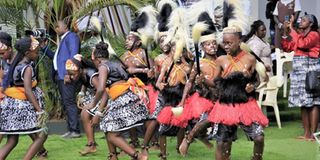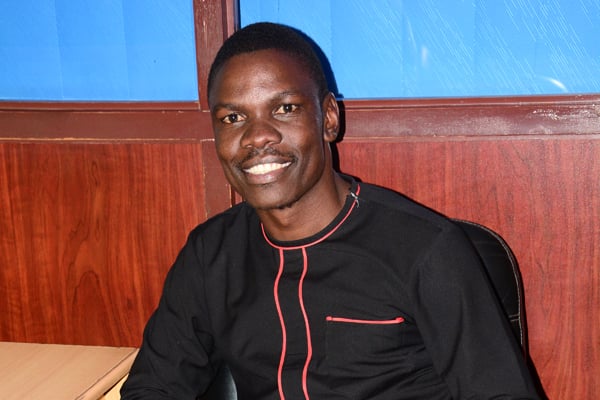Prime
Domestic tourism redeems sector out of Covid-19 mayhem

Cultural dances is one of the unique products tourists can experience in Uganda. PHOTO/COURTESY
What you need to know:
Experts say the tourism sector has staggered back to its feet through the promotion of domestic tourism, which has cut across gender and age, encouraging more Ugandans to discover the country
One afternoon as I matched into the office of the Principal Communications Officer of the Ministry of Tourism Eunice Tworekire Kansiime, one of the pictures that is hanged on the wall attracts my attention as I gape at a white man, wearing shots rolling a bicycle laden with bunches of matooke.
If it were a Ugandan, it would be clear the man is taking the matooke to the market, but a picture of a European portrays a man probably loving the experience.
Ministry of Tourism officials say this is the way domestic tourism is being marketed and how it has changed the face of the sector whose numbers in terms of visitors vehemently dwindled with the outbreak of the Covid19 between 2020 and 2021.
This year’s World Tourism which was celebrated in September 2022 Uganda under the theme “Rethinking Tourism” had most of the discussions revolving on domestic tourism as the key ingredient to the growth of the sector.
Panelists who held a discourse at Sheraton Hotel argued that showcasing food, dances, people and other Ugandan unique features would not only encourage indigenous people to explore the country but also increase the number of visitors from the international communities.
“We changed the approach to tourism from thinking the way we have been. It is domestic tourism that we are going for,” Minister of Tourism, Tom Butime says in an interview for this story.

Tom Butime, Minister of Tourism addressing the press at Uganda Media Centre. PHOTO/COURTESY
The latest United Nations World Tourism Organisation statistics indicate that the number of Uganda’s arrivals had collapsed to 470,000 from 1.5 million. As Covid-19 put the world to its knees with the total number of visitors across the universe to about 415 million in 2020 from the number that has always been anywhere between 1.4 billion international arrivals as of 2019.
Butime believes the sector has managed to stagger back to its feet through the promotion of domestic tourism, which has cut cross gender and age, encouraging more Ugandans to move and discover Uganda.
At the launch of the programme to promote domestic tourism in 2020, the Permanent Secretary at the Ministry of Tourism, Wildlife and Antiquities, Doreen Katusiime proposed that banks introduce travel and tourism products, where Ugandans can plan and save for travel, like most tourists do. She says this would increase on the revenue towards gross domestic tourism (GDP).
The shift in figures
Available information at the ministry shows that the tourist numbers to National Parks have fully recovered when compared to the 2019 levels. For instance, visitation to National parks grew by 7.5 percent in the first six months of 2022 from 129,511 in 2019 to 139,249 in 2022 showing full recovery when compared to 2019 levels.
So, if a total number of 139,249 tourists visited the National Parks in the first six months of 2022, it means there was an increase of 118.6 per cent in six months of stabilisation.
Minister Butime says because of promoting domestic tourism, Ugandans have been the main drivers of recovery of visitation to National Parks with a total of 84,260 Ugandans indicating a +41 per cent recovery over 2019.
“Visitation to the Uganda Wildlife Education Centre saw an increase in visitor numbers in the first six months of 2022 amounting to 129,647 visiting showing a +33.0 percent increase in 2019. This reflects full recovery in those months. Visitors to the Uganda Museum also fully recovered in the first six months of 2022 increasing by +23.5 percent over the same period in 2019.”
Low funding
But the shadow minister for tourism Karim Masaba says the only way tourism can shift fundamentally is by government deliberately injecting money into the sector.
“The sector that brings more than half the government budget is underfunded and yet they expect it to bring money. The sector and the whole ministry is limping with no budget allocation,” Masaba says.
Like all Ministries, Departments and Agencies (MDA) have suffered budgetary allocations, the ministry of tourism has not been spared. Saturday Monitor understands that with two months into the second quarter of the financial year that started in July, they have only received rent for the building they occupy at Nakasero Road in capital Kampala.

Deputy Speaker of Parliament, Thomas Tayebwa with Sudir Ruparelia
“There are operational costs and yet we have managed to fish these sectors from the dangerous claws of Covid-19 and promoted domestic tourism. There is a lot that is lacking, but we can just afford to wait,” a source says maintaining anonymity to speak freely in this story.
Budget cuts
On the same subject, Butime prefers to maintain peace with the ministry of finance, avoiding what he refers to as unnecessary squabbles, “I do not want to start a war with the ministry (of Finance) because they know what it means to be there without money.”
Documents accessed by this newspaper show that the Ministry budget for this financial budget was cut by about Shs20bn, which leaves the officials tongues-wagging.
For instance, in the 2020/2021 budget, the ministry received Shs197.4 billion, but this financial year has Shs179 billion. In distribution; Shs21 billion goes to the Ministry, Shs17.7 billion allocated to Uganda Tourism Board, Shs119 billion to Uganda Wildlife Authority.
The Uganda Wildlife Conservation Education Centre (UWEC) got Shs5.7 billion, Uganda Hotel and Tourism Training Institute got Shs5.7 billion, while Uganda Wildlife Research and Training Institute got Shs3.1 billion.
Road to recovery
Out of that distribution status, only Uganda Wildlife Authority did not decrease from what it was allocated in the last financial year, the rest got significant cuts.
“We shall have to go for supplementary budgets because we shall not facilitate our strategic plan if we do not help ourselves,” Minister Butime says in an interview adding that this may affect further figures in the international arrivals.
Despite the underfunding, figures show that international tourist arrivals to Uganda during the first seven months of 2022 grew by 49.7 per cent from 285,294 recorded in the same period in 2021 to 427,159 tourists by end of July 2022 thus showing great recovery but still a dramatic decline of -51.4 per cent versus the first seven months of 2019 Pre-Covid-19 levels. Therefore, we are at close to 50 per cent full recovery.
Traditional approaches
Tour operators attribute the growth to the strategies they set up to ensure that there is growth in domestic tourism which then encourages international tourists to come visiting after realising that the conditions are conducive.
Dickens Bategeki, the chief executive Q-Safaris Africa, says with the invasion of Covid-19, the international market was kicked out of the equation with more emphasis on how the domestic market could be explored.
“As the large businesses in the sectors had to take a break because their target audience had been affected, the sprouting companies took advantages organized group tourism events with slashed prices and they paid off,” Bategeki says
“We got support from government although it had first gone to the big business owners. The entrance at the big destinations like at Murchison Falls was restructured to fit into the pockets of the domestic tourist which helped to state the sector through the rough times of Covid19,” he adds.
“We are now showcasing local food, our heritage and the cultural dances and dress code,” Kansiime, the ministry communications officer, says in an interview.

Time to rethink the tourism
In the last tourism day celebrations, the ministry invited top businessmen in the country and politicians with a view to streamline the destinations in the land. “Until we rethink the tourism sector as Ugandans, the foreigners will always grow their own destinations and opt for other places. I like the theme of rethinking tourism for this event,” Ruparelia said in his speech at the dinner that followed the day’s celebrations. As a strategy, other development partners such as the Competitiveness and Enterprise Development Project (CEDP) have joined the campaign to further strengthen Uganda’s core tourism offerings and leverage tourism assets and biodiversity endowments for private sector-led growth.
CEDP officials say this will be achieved through upstream planning, policy, regulatory capacity building and targeted infrastructure improvements. These will incentivise private sector led management and revenue generation and use of incentives for the ministry to mobilise private investment.
Local hiring and training of local youth for participation in tourism-related opportunities, all activities (feasibility studies and business plans) in this component will assess climate change vulnerabilities and include specific measures to reduce the carbon footprint of the infrastructure upgrades and operations.
Ministry officials say they have encouraged people to embrace destinations within their own country as a way to emphasise the need to grow the sector.
Looming effects with Ebola
With the Ebola outbreak announced in September this year, there are already fears that the numbers of tourists have started dwindling as many visitors, according to tour operators, opted to cancel their flights and destination orders.
Butime is optimistic though, that this is going to be fought and the sector will not be significantly affected. “It depends on how the media cover and report Ebola stories. If we do not manage the information flow, we might end up exaggerating the situation, which will affect us. This is not a new scare and the government is dealing with it,” he says.
Early this week, the government was forced to direct schools to close by November 25 due to the fact that the Ebola outbreak has since claimed the lives of eight learners.
Content alligned with crisis
Already two districts have been placed under total lockdown to mitigate the spread of the Ebola Virus Disease with more districts, including the capital Kampala having the cases. The other affected districts include: Bunyangabu, Kagadi, Kampala, Kassanda, Kyegegwa, Mubende and Wakiso. The ministry of health has so far confirmed 132 cases of Ebola with 51 deaths.
Eric Ntalo, the UWEC spokesperson says: “There is a deliberate effort to generate content that creates awareness in times of pandemics for local tourists. Our clients are advised to follow the standard operating procedures (SOPs) and also avail them with literature on prevention.”





